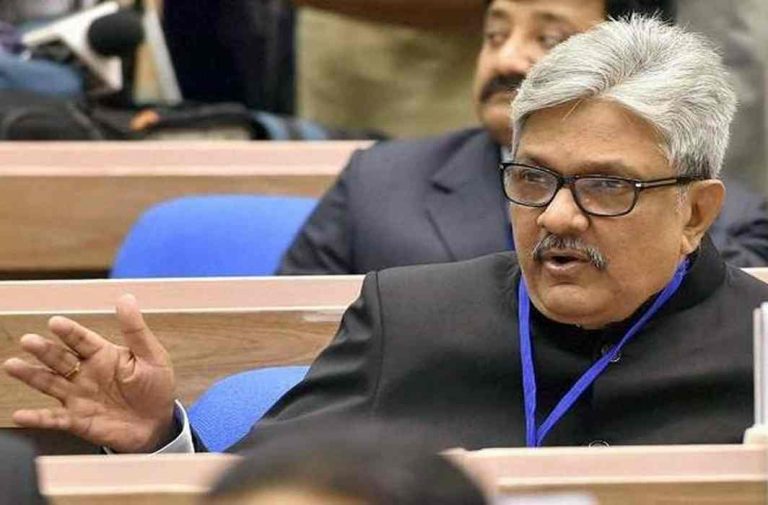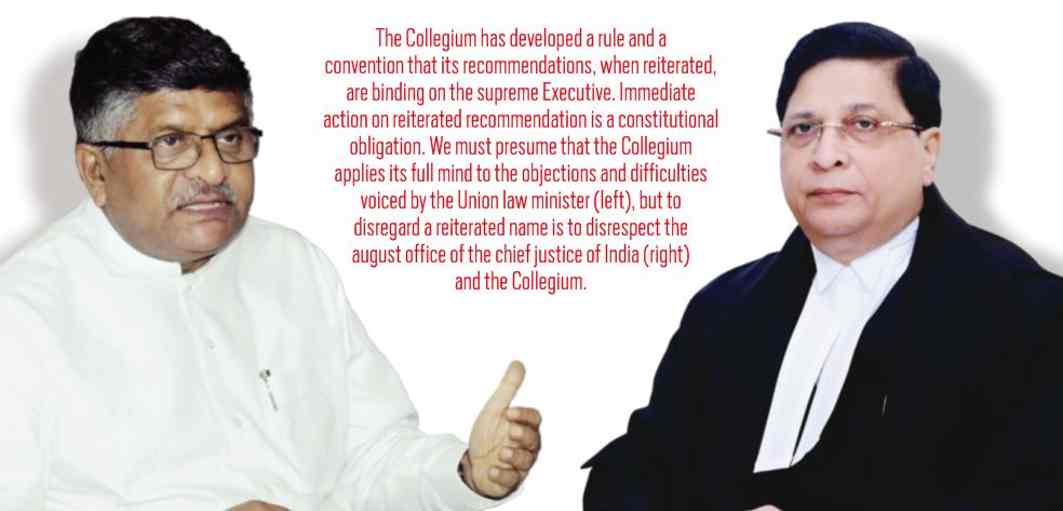
Above: The Collegium returned the name of Chief Justice KM Joseph to the Centre on July 6
It is the constitutional obligation of the Executive to take immediate action on a reiterated recommendation of the Collegium. To not do so is to disrespect the august office of the chief justice and leads to distrust

~By Upendra Baxi
The recent decisions of the Collegium (July 6, 2018) reiterating the elevation to the Supreme Court of Chief Justice KM Joseph (of the Uttarakhand High Court) and further recommendations regarding other justices has all over again revived, at least in the media and the constitutional elites, the debate on appointment and transfer of justices. The reiteration decision seems judiciously enunciated because it says that the Collegium has carefully considered two letters of the law minister (dated April 26 and April 30, 2018) and “resolves to reiterate the recommendation since nothing adverse has been said regarding the suitability of KM Joseph…”.
To be sure, these letters raised issues of general consideration about seniority-cum-merit, over-representation of justices from a few High Courts, and a policy of elevation which was more sensitive to the problems of marginalised sections of Indian society. These issues were probably extensively considered by their lordships. But the decision may be read as raising the sceptre of the conditional reiteration: is there an invitation to the law minister now to say something adverse against the reiterated Justice? Personally, I do not think so, but I wish that the collegium had more conclusively stated its reiteration, placing it beyond all further interpretation.
Any suspicion of prolonged rift between the apex court and the ruling executive detracts from good constitutional governance, very recently pronounced in the elaboration of the new notion of “constitutional renaissance” in the Lt-governor-Delhi government case. Such a distrust stands further aggravated when the Union takes its own time in actualising the elevation; a warrant of appointment must follow expeditiously and the seniority of the reiterated Justice be determined from the date of original nomination and not from the date of joining. This inescapably follows from the logic of reiteration.
All citizens have a stake, or interest, in all this because their basic rights to be and to remain human depend on the Judiciary, which usually protects and promotes all human rights in distress. In fact, the Supreme Court and the High Courts have increasingly justified judicial review powers by an appeal to the people’s trust and confidence in an independent Judiciary. Indeed, the four seniormost justices (on January 12, 2018) addressed a press conference when they asked the “nation” to ponder how benches in the Supreme Court may be constituted and how the Memorandum of Procedure (MoP) should now be finalised by the apex court given the inexplicable and unjustified delay in the Executive response to this task. It, therefore, sounds strange to hear that “ordinary” citizens should have no concern at all on how our Justices are elevated and that they must always trust the rule by the experts.
The people in whose name all power is legitimated may not have the expert knowledge; the informational flow among the citizens who rule is massive and very few ruled citizens can make an informed choice about who should be their Justices. But they have qualities that the elites do not necessarily have, and that makes all the difference. I still recall how scandalous I sounded to some finest ultra-activist justices (O Chinnappa Reddy, DA Desai, and Krishna Iyer) when during a discussion on an alternate system of appointing justices, I suggested a committee which would include persons like Baba Amte and Mother Teresa! They were astonished and asked me: “Baxi, do they know anything about law?” and I said next to nothing, but added that they knew a lot about justice, sacrifice, dedication and integrity. Surely, for appointment to all constitutional offices, domain knowledge is necessary, but so are other constitutional and social virtues.
As now happens, the Collegium has developed a rule and a convention that its recommendations, when reiterated, are binding on the supreme Executive. Immediate action on reiterated recommendation is a constitutional obligation. We must presume that the Collegium applies its full mind to the objections and difficulties voiced by the Union law minister on behalf of the Government of India (it has quite often refused to reiterate and proposes new names), but to disregard a reiterated name is to disrespect the august office of the chief justice of India and the Collegium and strikes at the very roots of judicial review powers.
The Collegium, however, has also recognised that the Executive may convey its reservations on names proposed, and may present other principled difficulties with its proposals. In rare situations of national security, it may even renegotiate the proposal. What have been called Judges IV decisions (I remain grateful to Additional Solicitor General Pinky Anand for drawing attention to this naming) stipulate two things: one, a new MoP shall be presented by the Union Executive and two, the Collegium shall, as far as possible, function in a transparent manner and post its decisions on the Supreme Court website.
The Court has performed its part of the bargain, though the website does not provide full reasons for decisions except to say that the proposed name is the “best” or most “appropriate”. Of course, full transparency and eradication of discretion in appointments is impossible because all aspirants are equally eligible. But still some more light must be shed to illuminate the norms for constitutional conventions already followed or in the process of development (such as regional representation, participation in the apex court by the excluded and discriminated sections of society and seniority-cum-merit principle).
The supreme Executive has yet to play its own part and submit a final MoP; it has so far not shown any urgency in doing so despite the press conference (on January 12, 2018) by four seniormost justices, who had earlier written a letter to the CJI suggesting the urgency of finalisation of the MoP and the imperative of judicial finalisation of the matter, if need be. No reasons for the lack of MoP is forthcoming, and the de facto diarchy in judicial elevations and transfers remains constitutionally deeply suspect, given the NJAC and earlier decisions concerning the elevation and transfer of justices.
The view that judicial elevation and transfers are best left to the Collegium and the Union of India, and that ordinary citizens should not take any interest in it is based on several implicit, and allied, foundational premises. First is the “democratic” argument that governors should take decisions for which power has been entrusted to them by the governed at the hustings. Second is the epistemic argument which says, in effect, that ordinary people do not have the deep knowledge of law (the legal and adjudicative professions) requisite for choices of judicial elevations and transfers. The third refers to inherent tension between governance and participation: in a complex society, surely, it is argued that governance will become impossible if all the major decisions had to be directly based on citizen’s consent or legitimation. constitutional elites, rather than laity, should, therefore, decide.
The privilege to take necessary decisions lies with the Collegium and ultimately, the president of India, but the above arguments (frequently made) are not convincing. Most worrisome is the distinction between “ordinary” people and “experts/rulers”. In a constitutional democracy, which is also a republic, there are no ordinary citizens different from governors; surely, the very meaning of a republic is that everyone has equal dignity and rights as co-citizens. Besides, in democratic constitutional governance, the State (courts have held) is a legal sovereign, but power comes from the consent of the governed. Power is a form of public trust. If there are any ordinary citizens, all are so in a democratic republic. Some govern and most are governed, but a citizen is a being (as Aristotle reminded us a very long time ago) who knows the art of ruling as well as the art of being ruled.
The mandate to rule co-citizens is not a permanent mandate in a system that ordains the circulation of competing elites. Upon retirement from political or bureaucratic vocation, the previous incumbent citizens enjoy all the rights of co-citizens. Neither the Constitution nor courts recognize any “super-citizen”.
The judicial doctrine that all power is held in public trust makes the most complete sense when all citizens are regarded as equal. It then surely follows that citizens have a stake in whom, when and why some types of citizens become anointed as Justices to the exclusion of others. Political and adjudicatory powers owe a human rights duty to justify particular appointments or transfer. The right to justification for any exercise of public power to decide (which is still poorly called “accountability”) is a core human right attached to all forms of governance.
—The author is an international law scholar, an acclaimed teacher and a well-known writer

